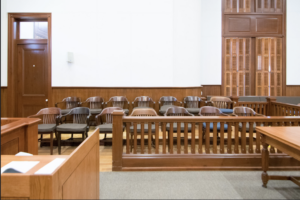 Public.Resource.org, working with Harvard Law School’s Cyberlaw Clinic, has advanced its mission to enhance public access to government information by challenging states that improperly claim copyright protection over model jury instructions used by litigants in state courts. By making model jury instructions available to the public, and by encouraging states to remove barriers to access, Public.Resource.org aims to enhance access to justice and promote engagement with the judicial process.
Public.Resource.org, working with Harvard Law School’s Cyberlaw Clinic, has advanced its mission to enhance public access to government information by challenging states that improperly claim copyright protection over model jury instructions used by litigants in state courts. By making model jury instructions available to the public, and by encouraging states to remove barriers to access, Public.Resource.org aims to enhance access to justice and promote engagement with the judicial process.
A state jury trial generally culminates with the judge’s charging the jury — instructing it how to consider the evidence presented by both sides and assess that evidence in the context of applicable law. Courts rely on model jury instructions to ensure juries operate in accordance with clear and consistent standards.
If a private individual or company develops a template set of jury instructions, that individual or company may be able to claim rights in the resulting document. But, many states rely on government-affiliated bodies to develop pattern jury instructions. Too often, states wrongly treat these model documents as subject to federal copyright protection — licensing them to commercial companies and significantly restricting access.
This approach flies in the face of the long-standing “edicts of government” doctrine, which makes clear that government edicts may not be subjects of copyright. The United States Supreme Court confirmed just last year — in a case involving Public.Resource.org’s efforts to make available the Official Code of Georgia Annotated — that such edicts are not entitled to copyright protection and legally belong in the public domain.
A set of model jury instructions, crafted by a state government entity, fits neatly into the definition of an edict of government. Thus, efforts by states to limit their distribution are improper.
By way of example, the New York Pattern Jury Instructions—Civil (the “PJI”) are model instructions and explanations to be given to jurors in the state’s civil cases. The PJI was created by New York judges in the course of their judicial duties and therefore squarely qualifies as an edict of government. Despite the clarity of the law, however, the current PJI includes a copyright notice that purports to vest ownership in the state’s Unified Court System. It can only be accessed by paying a $1,960 fee to a commercial publisher.
The State of New York is not unique in improperly asserting ownership over these types of works. Given the rightful legal status of these works, Public.Resource.org has made the PJI and model jury instructions from eighteen additional states, publicly available and digitally accessible on the non-profit Internet Archive. On behalf of Public.Resource.org, the Cyberlaw Clinic has sent letters to nine state governments, notifying officials that their instructions have been posted and asking them to support Public.Resource.org in recognizing that these documents are edicts of government and expanding accessibility to them. This fall, the Cyberlaw Clinic was pleased to have supported Public.Resource.org and its effort to eliminate barriers to access to judicial materials, sending letters to judges and other officials in the following states:
Public.Resource.org’s Founder and President, Carl Malamud, hopes that this strategy will be effective in increasing the ability of the general public to access these important government materials. “These letters are really a way of making government officials aware of the problem,” notes Malamud. “They say, ‘Hey – we know you care about transparency. We know that’s why you made these instructions in the first place. At the same time, though, the usefulness of the instructions is limited until everyone has access. And, by the way, our position is also in line with the law.’”
Some states have already taken steps to provide public access to their model instructions. Oftentimes, however, these instructions have continued to include copyright disclaimers. Such notices “serve effectively as ‘Keep Off the Grass’ signs,” says Malamud. “They create a chilling effect, because people are not sure how they can use the materials, and they don’t want to create any trouble for themselves.”
Copyright notices discourage individuals not just from using model jury instructions but from reposting them elsewhere and adapting them into formats that may be more accessible. “The versions of the instructions that Public.Resource posted were run through technology that makes them easier to navigate and also accessible to the visually impaired,” says Malamud. “This opens the door for a lot more people to see them.”
The goal is to encourage state government officials to respond to these letters by acknowledging these materials as edicts of government and treating them accordingly. Public.Resource.org and the Clinic look forward to states’ responses to the letters.
Fall 2021 Cyberlaw Clinic students Courtney Carpinello and Brent Mobbs worked on the project with Public.Resource.org, collaborating closely with attorney David Halperin and HLS Clinical Professor Christopher Bavitz.
Image, “Jury Box, Courtroom, Wharton County Courthouse, Wharton, Texas 1710191331,” by Flickr User Patrick Feller, CC-BY-2.0, available at https://www.flickr.com/photos/nakrnsm/37883051331/in/photostream/.
